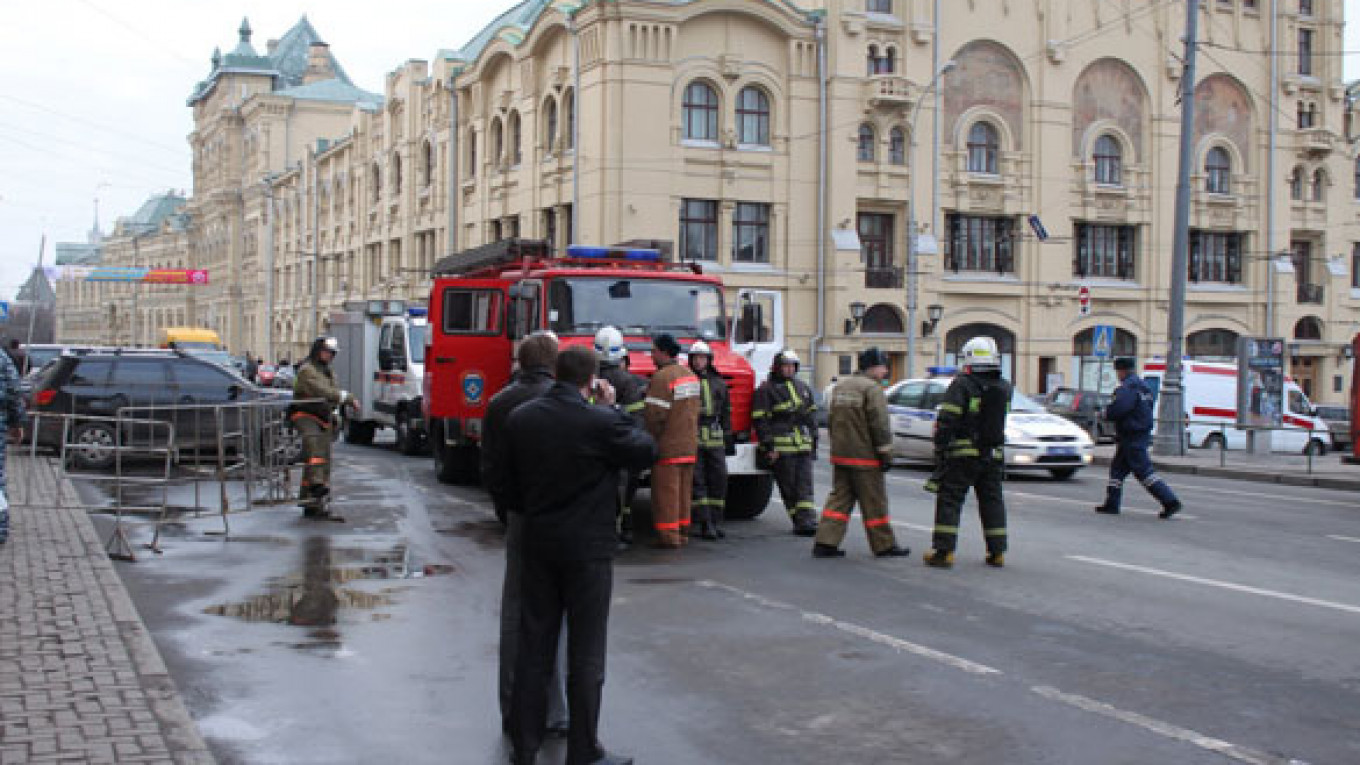The gray streets around the Lubyanka metro station seemed eerily quiet in the moments after the first bomb went off at 7:57 a.m. during morning rush-hour traffic.
Then the masses of people began to emerge from the metro, surging out of underpasses and heading onward by foot.
The throng included many children. Monday marked the first day of school after a weeklong spring break, with classes beginning at 8:30 a.m.
Police cordoned off all metro access points on Lubyanskaya Ploshchad, dominated by the towering yet empty-windowed headquarters of the Federal Security Service. Fire trucks and ambulances stood idly waiting. A helicopter clattered into the square for a brief stop.
As journalists came trickling into the square, some dressed in obvious haste, many wondered out loud why there were no visible signs of a terrorist attack — no traumatized or bleeding passengers anywhere to be seen.
As news started swirling about the second bomb blast at 8:37 a.m. in the Park Kultury metro station, officials approached the pack of reporters gathered near the empty grass knoll where the statue of Soviet secret police founder Felix Dzerzhinsky once stood.
Investigative Committee spokesman Vladimir Markin spoke first, announcing an update on the number of victims and saying the Lubyanka blast had occurred in the second train car.
Minutes later, Moscow's white-haired chief prosecutor, Yury Syomin, wearing a bright blue coat, a huge saucer cap and glasses, emerged from the metro. He was one of the first officials to say the attacks appeared to have been carried out by female suicide bombers. He also said the Lubyanka train had already closed its doors and was about to leave the station headed north when the explosion occurred.
Pressed by reporters about the number of victims, Syomin said soberly, “There is no time to count the dead, only time to save the injured.”
Later, a white Emergency Situations Ministry helicopter with orange and blue stripes swooped onto the square. It left 15 minutes later. It was not immediately clear whether it had picked up any victims.
Despite nearly immediate media coverage, passengers riding on the Ring Line less than an hour after the first explosion were calm, answering repeated calls from anxious friends and relatives. Most of the metro continued operating throughout the day.
Loudspeakers announced that trains had stopped running between the Komsomolskaya and Sportivnaya stations on the Red Line, while all transfers between lines were closed "for technical reasons."
Seven kilometers across town from Lubyanka — or three stops southbound along the metro's Red Line — wounded survivors of the second blast were seen being rushed from the scene by helicopter and ambulance.
Passengers exiting the Ring Line station panicked as they saw bloody rags outside the exit and crowds of police, firefighters and health officials directing them through the smoke-laden air.
Some confused passers-by tried to break though the police cordon, vividly explaining that they needed to get to work.
Mayor Yury Luzhkov arrived at about 10 a.m., when the injured had already been rushed away. Looking pale and stressed in his black coat and trademark cap, the mayor approached reporters to comment briefly on the latest developments.
"According to the FSB, the attacks were carried out by two female suicide bombers," Luzhkov said. The bombs were detonated when the trains were near passenger platforms so that the casualty toll would be higher, he said.
Rumors soon began flying about a third attack at the Prospekt Mira station, although police quickly corrected the information and asked journalists to be more careful.
By evening, both stations had been reopened, and state television showed Luzhkov and President Dmitry Medvedev laying flowers at Lubyanka.
An emotional Medvedev told reporters and mourners that justice would be done.
"We'll find them, and we'll eliminate them all. The same way we recently eliminated everyone who organized the Nevsky Express explosion. To dust," he said.
"This cannot be tolerated anymore."
A Message from The Moscow Times:
Dear readers,
We are facing unprecedented challenges. Russia's Prosecutor General's Office has designated The Moscow Times as an "undesirable" organization, criminalizing our work and putting our staff at risk of prosecution. This follows our earlier unjust labeling as a "foreign agent."
These actions are direct attempts to silence independent journalism in Russia. The authorities claim our work "discredits the decisions of the Russian leadership." We see things differently: we strive to provide accurate, unbiased reporting on Russia.
We, the journalists of The Moscow Times, refuse to be silenced. But to continue our work, we need your help.
Your support, no matter how small, makes a world of difference. If you can, please support us monthly starting from just $2. It's quick to set up, and every contribution makes a significant impact.
By supporting The Moscow Times, you're defending open, independent journalism in the face of repression. Thank you for standing with us.
Remind me later.


